Literacy and Oral Skills in Education Support Assignment
VerifiedAdded on 2022/11/13
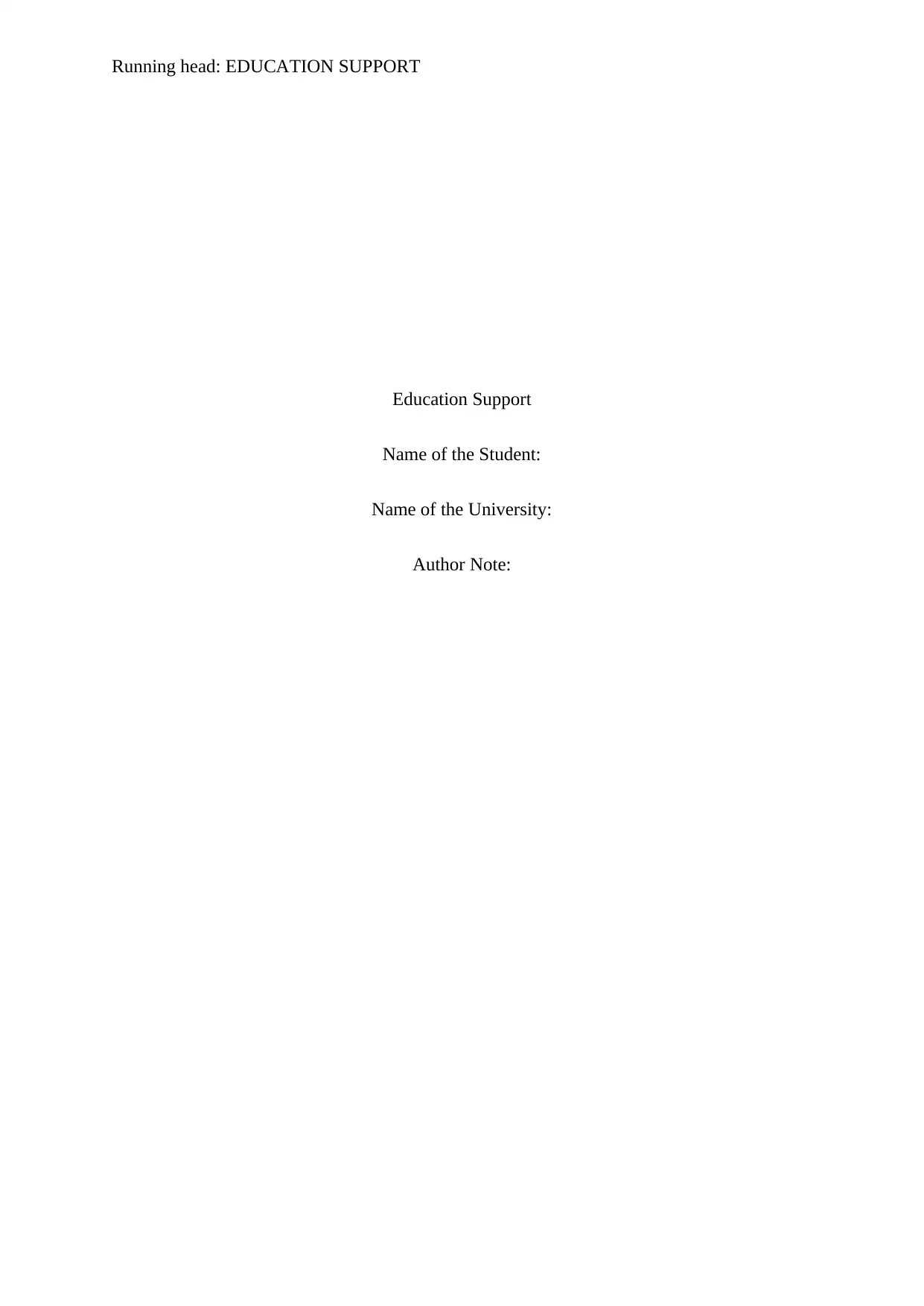
Education Support
Name of the Student:
Name of the University:
Author Note:
Paraphrase This Document
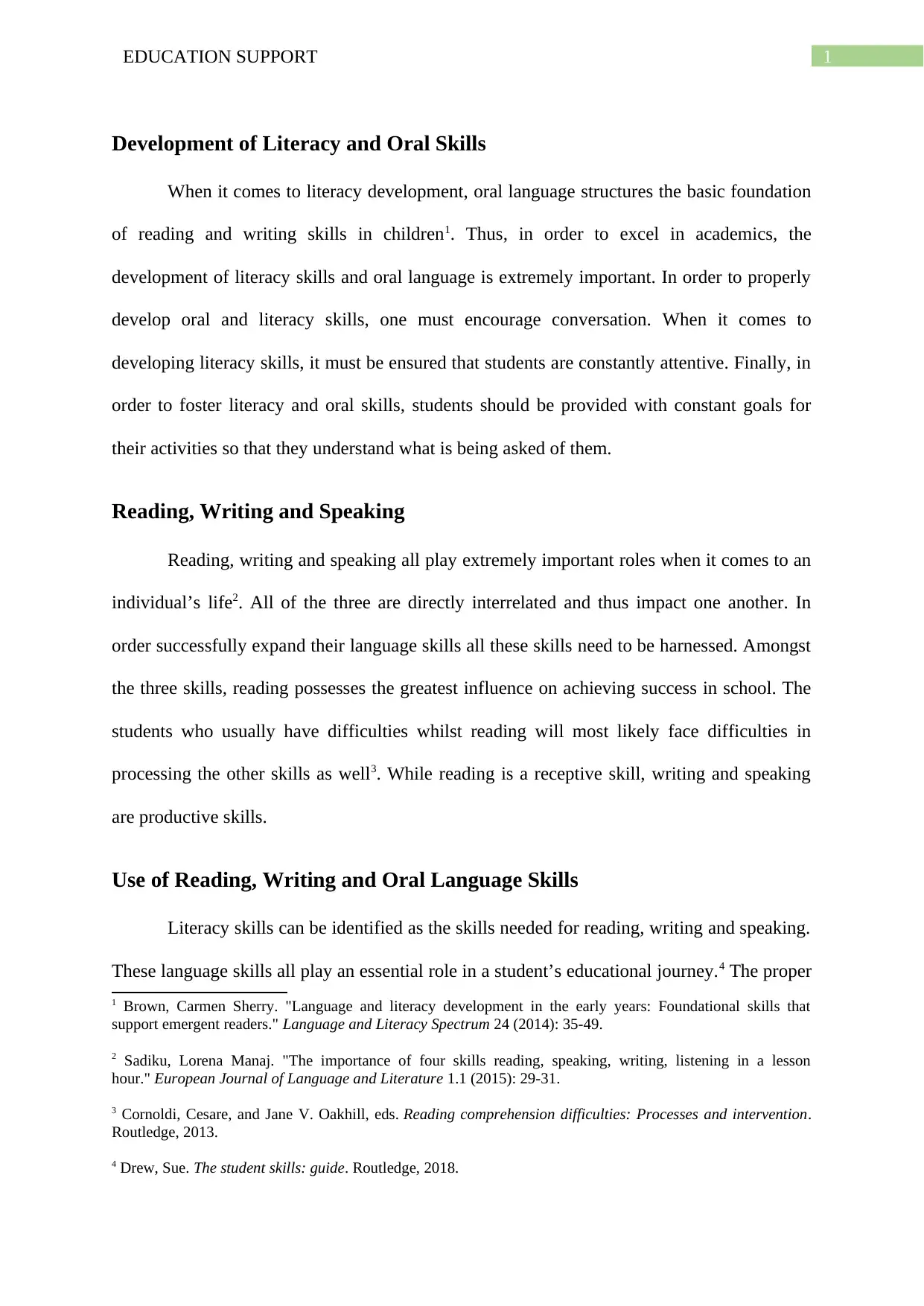
Development of Literacy and Oral Skills
When it comes to literacy development, oral language structures the basic foundation
of reading and writing skills in children1. Thus, in order to excel in academics, the
development of literacy skills and oral language is extremely important. In order to properly
develop oral and literacy skills, one must encourage conversation. When it comes to
developing literacy skills, it must be ensured that students are constantly attentive. Finally, in
order to foster literacy and oral skills, students should be provided with constant goals for
their activities so that they understand what is being asked of them.
Reading, Writing and Speaking
Reading, writing and speaking all play extremely important roles when it comes to an
individual’s life2. All of the three are directly interrelated and thus impact one another. In
order successfully expand their language skills all these skills need to be harnessed. Amongst
the three skills, reading possesses the greatest influence on achieving success in school. The
students who usually have difficulties whilst reading will most likely face difficulties in
processing the other skills as well3. While reading is a receptive skill, writing and speaking
are productive skills.
Use of Reading, Writing and Oral Language Skills
Literacy skills can be identified as the skills needed for reading, writing and speaking.
These language skills all play an essential role in a student’s educational journey.4 The proper
1 Brown, Carmen Sherry. "Language and literacy development in the early years: Foundational skills that
support emergent readers." Language and Literacy Spectrum 24 (2014): 35-49.
2 Sadiku, Lorena Manaj. "The importance of four skills reading, speaking, writing, listening in a lesson
hour." European Journal of Language and Literature 1.1 (2015): 29-31.
3 Cornoldi, Cesare, and Jane V. Oakhill, eds. Reading comprehension difficulties: Processes and intervention.
Routledge, 2013.
4 Drew, Sue. The student skills: guide. Routledge, 2018.
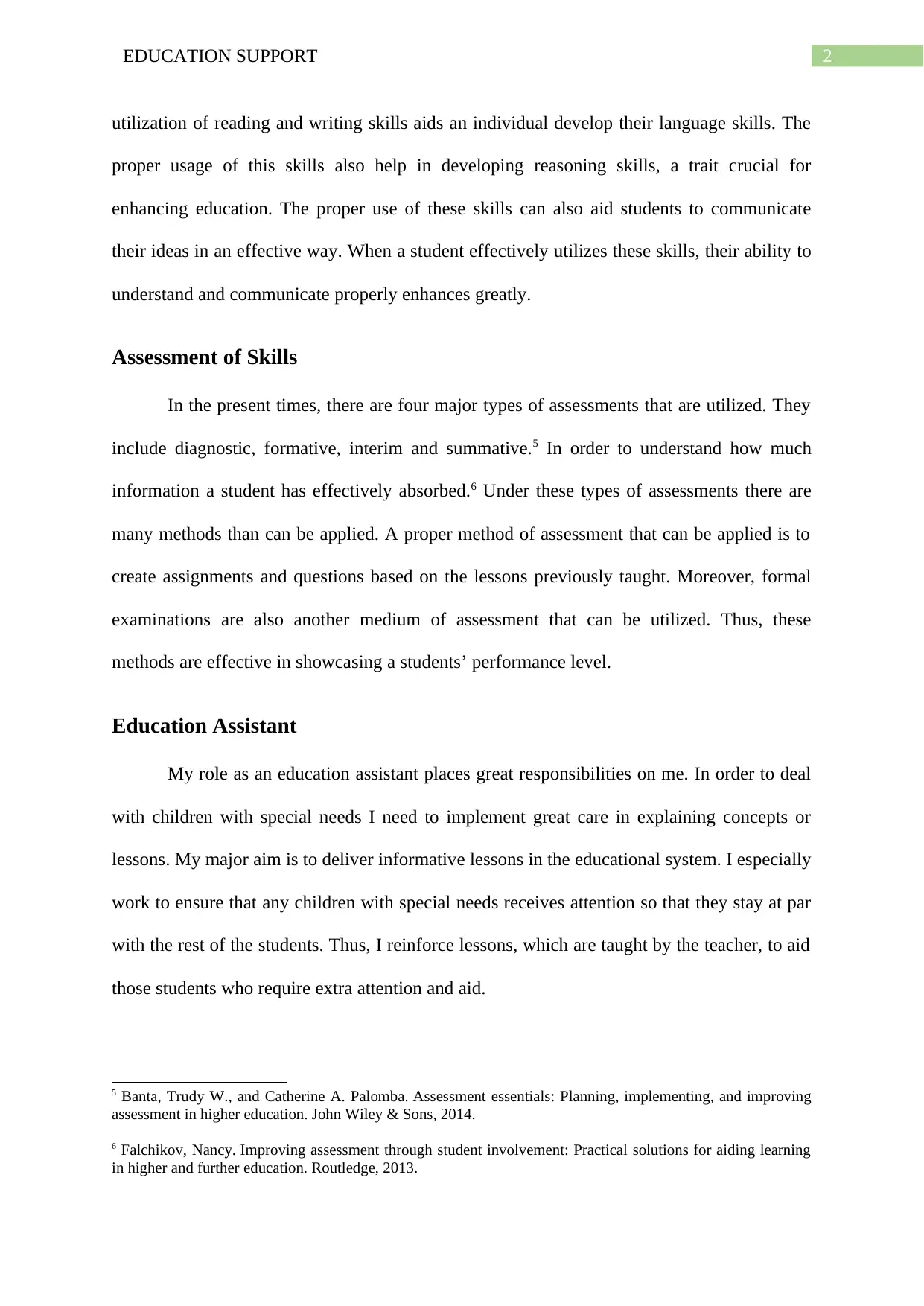
utilization of reading and writing skills aids an individual develop their language skills. The
proper usage of this skills also help in developing reasoning skills, a trait crucial for
enhancing education. The proper use of these skills can also aid students to communicate
their ideas in an effective way. When a student effectively utilizes these skills, their ability to
understand and communicate properly enhances greatly.
Assessment of Skills
In the present times, there are four major types of assessments that are utilized. They
include diagnostic, formative, interim and summative.5 In order to understand how much
information a student has effectively absorbed.6 Under these types of assessments there are
many methods than can be applied. A proper method of assessment that can be applied is to
create assignments and questions based on the lessons previously taught. Moreover, formal
examinations are also another medium of assessment that can be utilized. Thus, these
methods are effective in showcasing a students’ performance level.
Education Assistant
My role as an education assistant places great responsibilities on me. In order to deal
with children with special needs I need to implement great care in explaining concepts or
lessons. My major aim is to deliver informative lessons in the educational system. I especially
work to ensure that any children with special needs receives attention so that they stay at par
with the rest of the students. Thus, I reinforce lessons, which are taught by the teacher, to aid
those students who require extra attention and aid.
5 Banta, Trudy W., and Catherine A. Palomba. Assessment essentials: Planning, implementing, and improving
assessment in higher education. John Wiley & Sons, 2014.
6 Falchikov, Nancy. Improving assessment through student involvement: Practical solutions for aiding learning
in higher and further education. Routledge, 2013.
⊘ This is a preview!⊘
Do you want full access?
Subscribe today to unlock all pages.

Trusted by 1+ million students worldwide
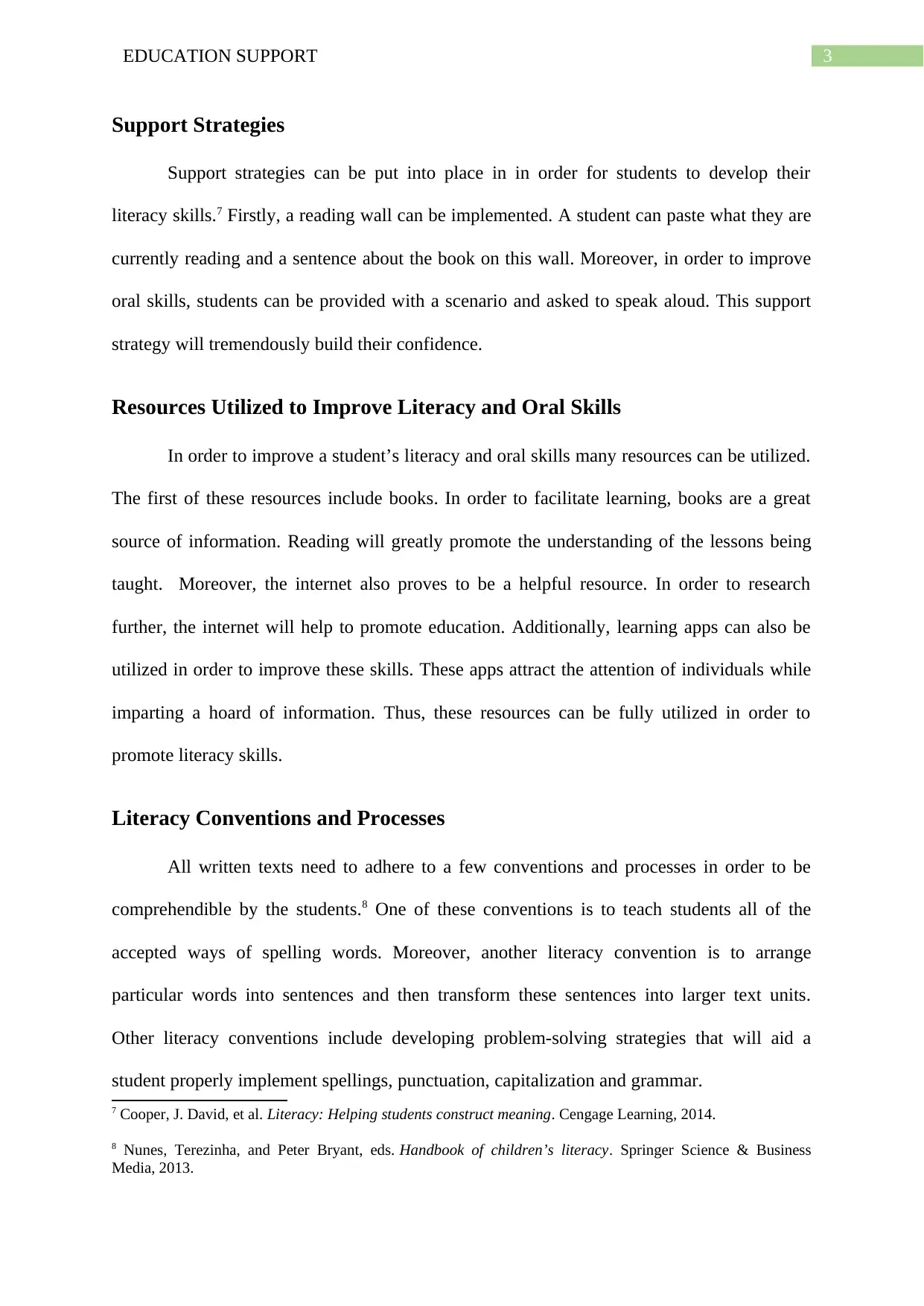
Support Strategies
Support strategies can be put into place in in order for students to develop their
literacy skills.7 Firstly, a reading wall can be implemented. A student can paste what they are
currently reading and a sentence about the book on this wall. Moreover, in order to improve
oral skills, students can be provided with a scenario and asked to speak aloud. This support
strategy will tremendously build their confidence.
Resources Utilized to Improve Literacy and Oral Skills
In order to improve a student’s literacy and oral skills many resources can be utilized.
The first of these resources include books. In order to facilitate learning, books are a great
source of information. Reading will greatly promote the understanding of the lessons being
taught. Moreover, the internet also proves to be a helpful resource. In order to research
further, the internet will help to promote education. Additionally, learning apps can also be
utilized in order to improve these skills. These apps attract the attention of individuals while
imparting a hoard of information. Thus, these resources can be fully utilized in order to
promote literacy skills.
Literacy Conventions and Processes
All written texts need to adhere to a few conventions and processes in order to be
comprehendible by the students.8 One of these conventions is to teach students all of the
accepted ways of spelling words. Moreover, another literacy convention is to arrange
particular words into sentences and then transform these sentences into larger text units.
Other literacy conventions include developing problem-solving strategies that will aid a
student properly implement spellings, punctuation, capitalization and grammar.
7 Cooper, J. David, et al. Literacy: Helping students construct meaning. Cengage Learning, 2014.
8 Nunes, Terezinha, and Peter Bryant, eds. Handbook of children’s literacy. Springer Science & Business
Media, 2013.
Paraphrase This Document
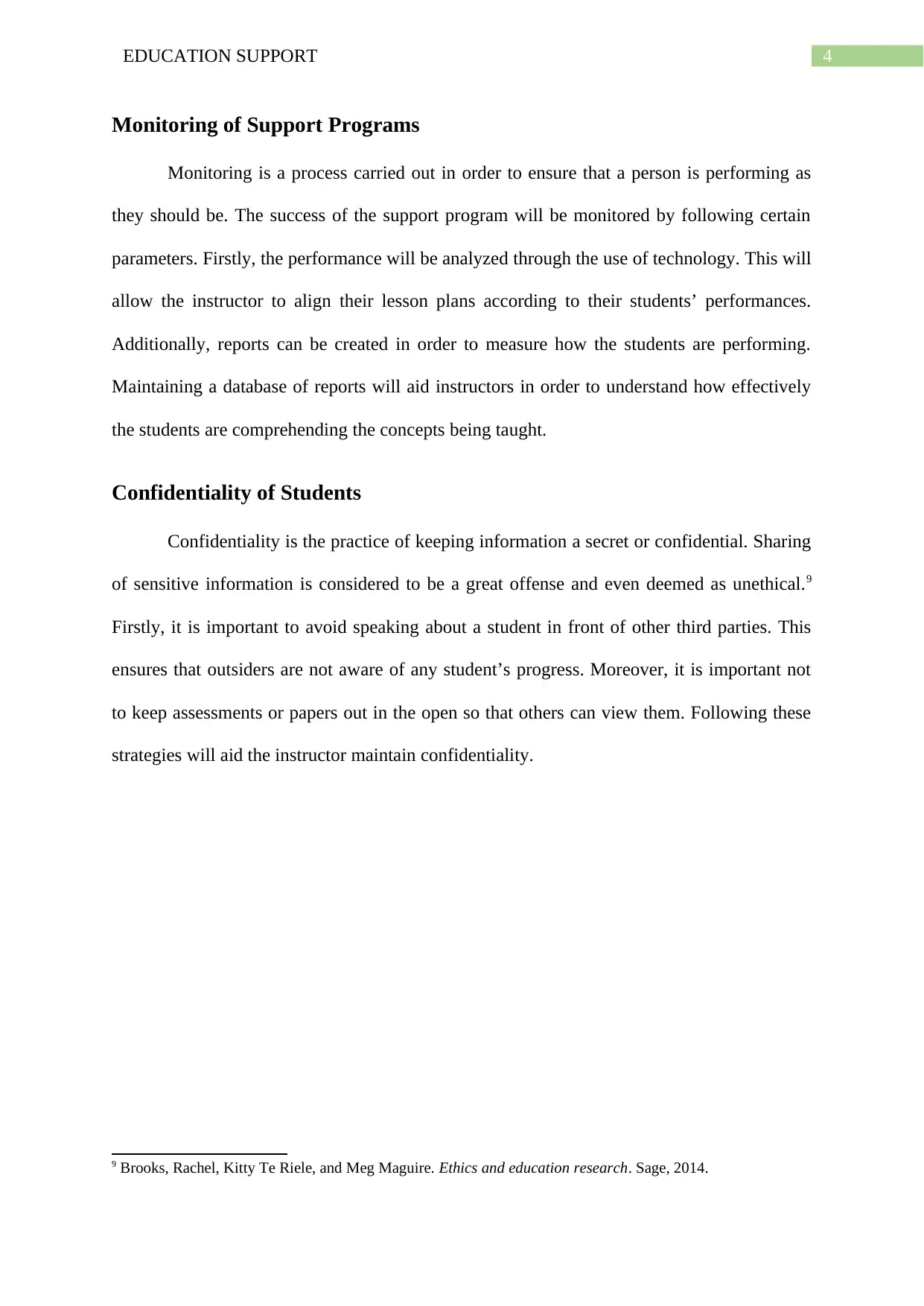
Monitoring of Support Programs
Monitoring is a process carried out in order to ensure that a person is performing as
they should be. The success of the support program will be monitored by following certain
parameters. Firstly, the performance will be analyzed through the use of technology. This will
allow the instructor to align their lesson plans according to their students’ performances.
Additionally, reports can be created in order to measure how the students are performing.
Maintaining a database of reports will aid instructors in order to understand how effectively
the students are comprehending the concepts being taught.
Confidentiality of Students
Confidentiality is the practice of keeping information a secret or confidential. Sharing
of sensitive information is considered to be a great offense and even deemed as unethical.9
Firstly, it is important to avoid speaking about a student in front of other third parties. This
ensures that outsiders are not aware of any student’s progress. Moreover, it is important not
to keep assessments or papers out in the open so that others can view them. Following these
strategies will aid the instructor maintain confidentiality.
9 Brooks, Rachel, Kitty Te Riele, and Meg Maguire. Ethics and education research. Sage, 2014.
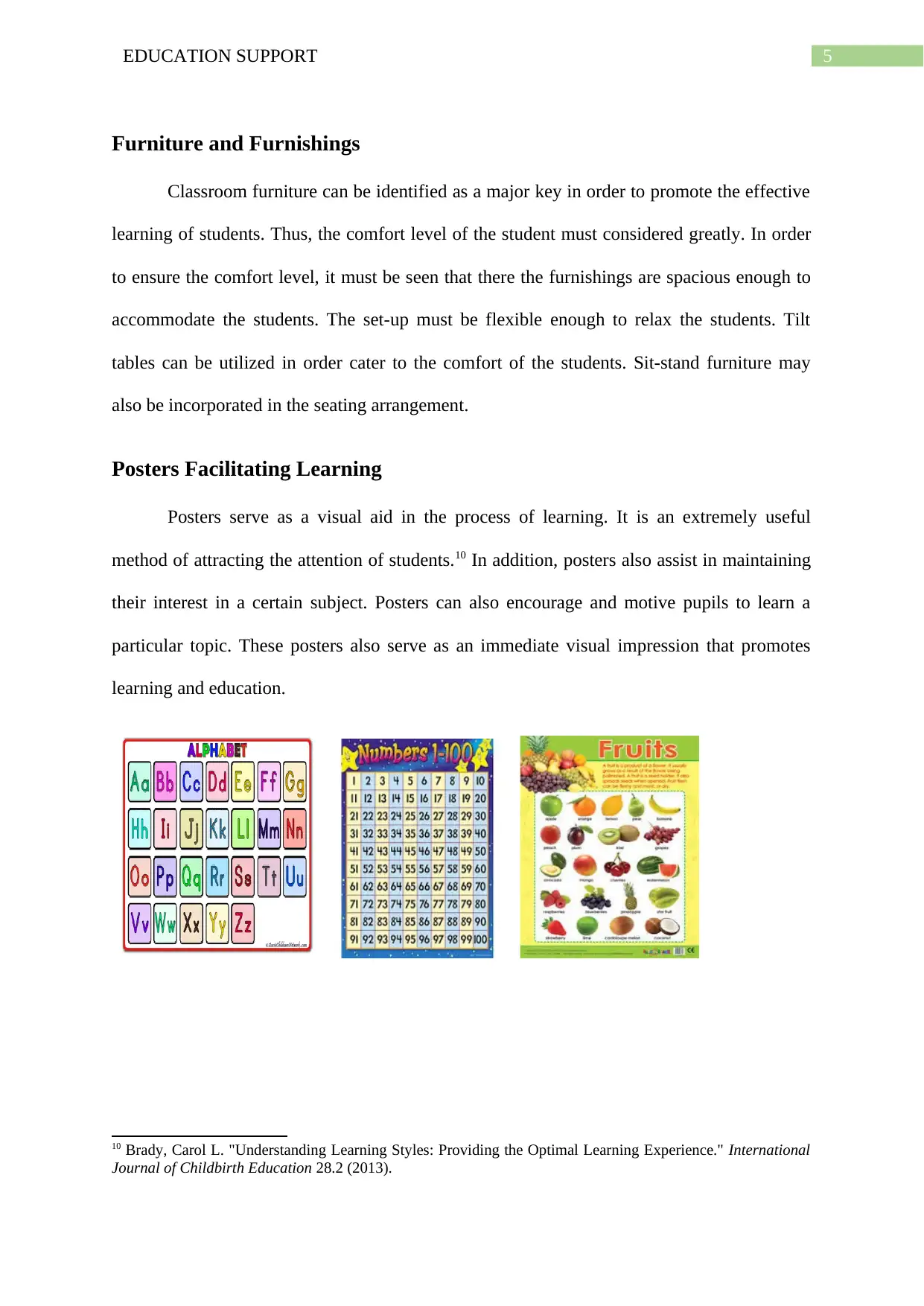
Furniture and Furnishings
Classroom furniture can be identified as a major key in order to promote the effective
learning of students. Thus, the comfort level of the student must considered greatly. In order
to ensure the comfort level, it must be seen that there the furnishings are spacious enough to
accommodate the students. The set-up must be flexible enough to relax the students. Tilt
tables can be utilized in order cater to the comfort of the students. Sit-stand furniture may
also be incorporated in the seating arrangement.
Posters Facilitating Learning
Posters serve as a visual aid in the process of learning. It is an extremely useful
method of attracting the attention of students.10 In addition, posters also assist in maintaining
their interest in a certain subject. Posters can also encourage and motive pupils to learn a
particular topic. These posters also serve as an immediate visual impression that promotes
learning and education.
10 Brady, Carol L. "Understanding Learning Styles: Providing the Optimal Learning Experience." International
Journal of Childbirth Education 28.2 (2013).
⊘ This is a preview!⊘
Do you want full access?
Subscribe today to unlock all pages.

Trusted by 1+ million students worldwide
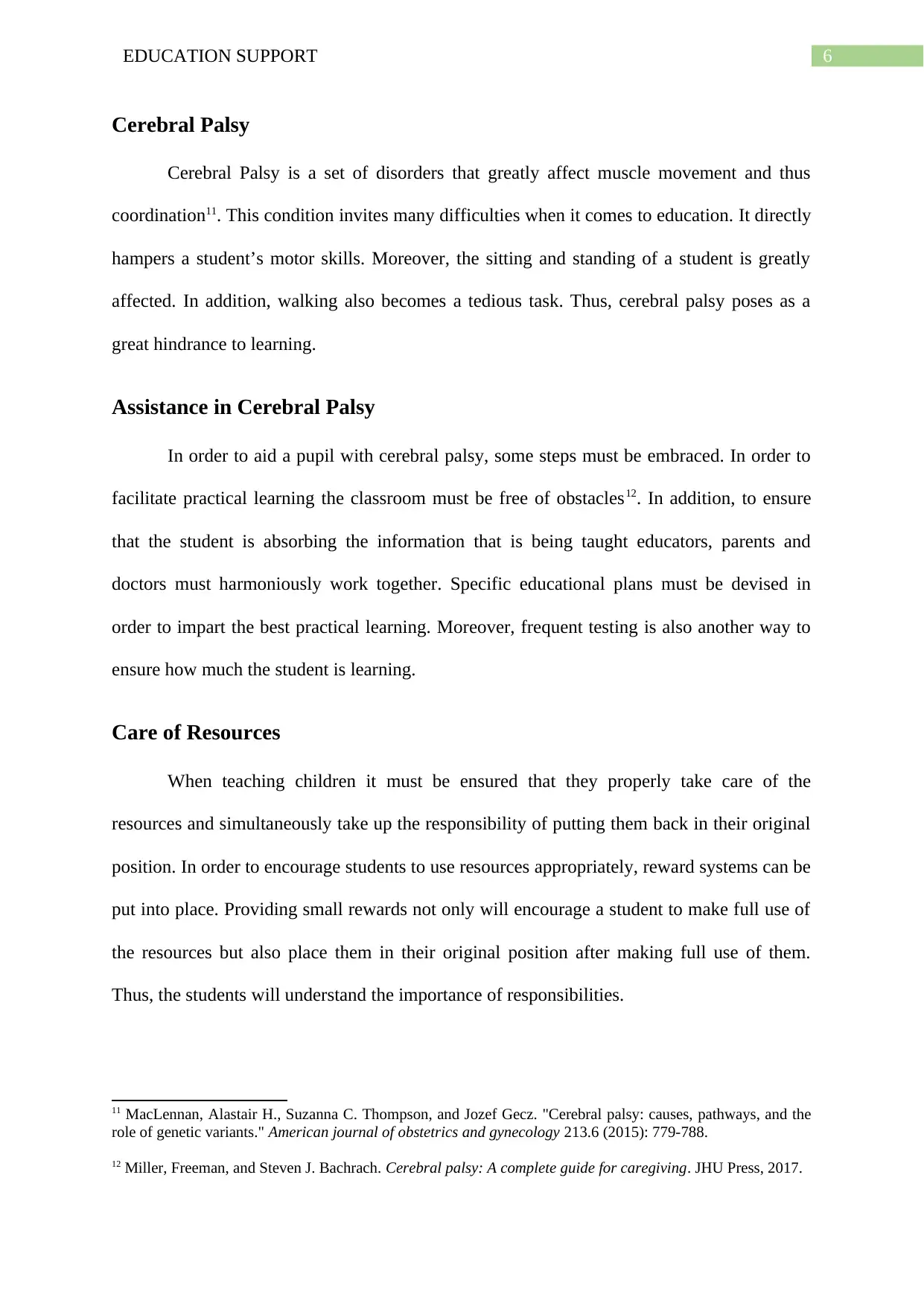
Cerebral Palsy
Cerebral Palsy is a set of disorders that greatly affect muscle movement and thus
coordination11. This condition invites many difficulties when it comes to education. It directly
hampers a student’s motor skills. Moreover, the sitting and standing of a student is greatly
affected. In addition, walking also becomes a tedious task. Thus, cerebral palsy poses as a
great hindrance to learning.
Assistance in Cerebral Palsy
In order to aid a pupil with cerebral palsy, some steps must be embraced. In order to
facilitate practical learning the classroom must be free of obstacles12. In addition, to ensure
that the student is absorbing the information that is being taught educators, parents and
doctors must harmoniously work together. Specific educational plans must be devised in
order to impart the best practical learning. Moreover, frequent testing is also another way to
ensure how much the student is learning.
Care of Resources
When teaching children it must be ensured that they properly take care of the
resources and simultaneously take up the responsibility of putting them back in their original
position. In order to encourage students to use resources appropriately, reward systems can be
put into place. Providing small rewards not only will encourage a student to make full use of
the resources but also place them in their original position after making full use of them.
Thus, the students will understand the importance of responsibilities.
11 MacLennan, Alastair H., Suzanna C. Thompson, and Jozef Gecz. "Cerebral palsy: causes, pathways, and the
role of genetic variants." American journal of obstetrics and gynecology 213.6 (2015): 779-788.
12 Miller, Freeman, and Steven J. Bachrach. Cerebral palsy: A complete guide for caregiving. JHU Press, 2017.
Paraphrase This Document
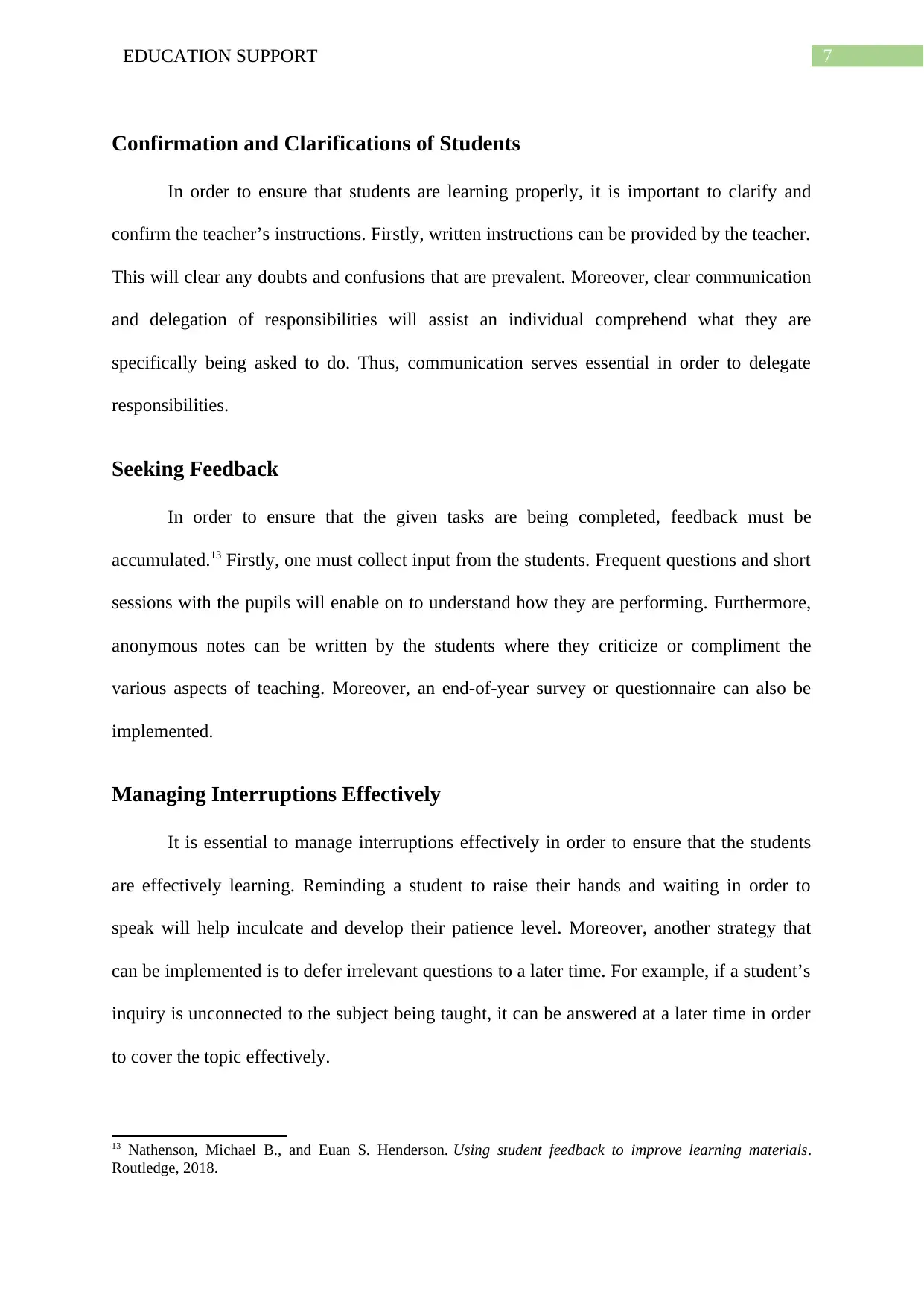
Confirmation and Clarifications of Students
In order to ensure that students are learning properly, it is important to clarify and
confirm the teacher’s instructions. Firstly, written instructions can be provided by the teacher.
This will clear any doubts and confusions that are prevalent. Moreover, clear communication
and delegation of responsibilities will assist an individual comprehend what they are
specifically being asked to do. Thus, communication serves essential in order to delegate
responsibilities.
Seeking Feedback
In order to ensure that the given tasks are being completed, feedback must be
accumulated.13 Firstly, one must collect input from the students. Frequent questions and short
sessions with the pupils will enable on to understand how they are performing. Furthermore,
anonymous notes can be written by the students where they criticize or compliment the
various aspects of teaching. Moreover, an end-of-year survey or questionnaire can also be
implemented.
Managing Interruptions Effectively
It is essential to manage interruptions effectively in order to ensure that the students
are effectively learning. Reminding a student to raise their hands and waiting in order to
speak will help inculcate and develop their patience level. Moreover, another strategy that
can be implemented is to defer irrelevant questions to a later time. For example, if a student’s
inquiry is unconnected to the subject being taught, it can be answered at a later time in order
to cover the topic effectively.
13 Nathenson, Michael B., and Euan S. Henderson. Using student feedback to improve learning materials.
Routledge, 2018.
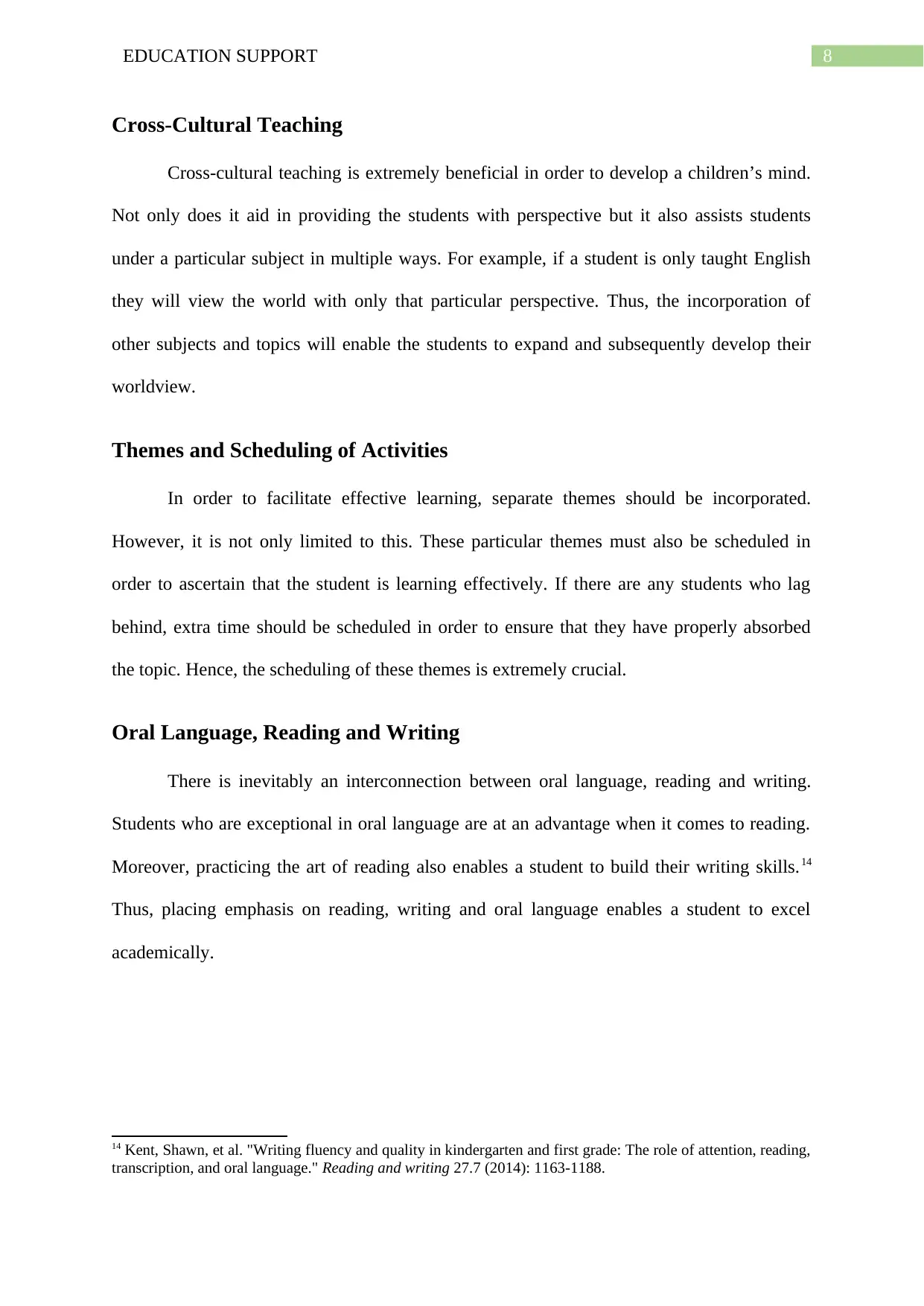
Cross-Cultural Teaching
Cross-cultural teaching is extremely beneficial in order to develop a children’s mind.
Not only does it aid in providing the students with perspective but it also assists students
under a particular subject in multiple ways. For example, if a student is only taught English
they will view the world with only that particular perspective. Thus, the incorporation of
other subjects and topics will enable the students to expand and subsequently develop their
worldview.
Themes and Scheduling of Activities
In order to facilitate effective learning, separate themes should be incorporated.
However, it is not only limited to this. These particular themes must also be scheduled in
order to ascertain that the student is learning effectively. If there are any students who lag
behind, extra time should be scheduled in order to ensure that they have properly absorbed
the topic. Hence, the scheduling of these themes is extremely crucial.
Oral Language, Reading and Writing
There is inevitably an interconnection between oral language, reading and writing.
Students who are exceptional in oral language are at an advantage when it comes to reading.
Moreover, practicing the art of reading also enables a student to build their writing skills.14
Thus, placing emphasis on reading, writing and oral language enables a student to excel
academically.
14 Kent, Shawn, et al. "Writing fluency and quality in kindergarten and first grade: The role of attention, reading,
transcription, and oral language." Reading and writing 27.7 (2014): 1163-1188.
⊘ This is a preview!⊘
Do you want full access?
Subscribe today to unlock all pages.

Trusted by 1+ million students worldwide
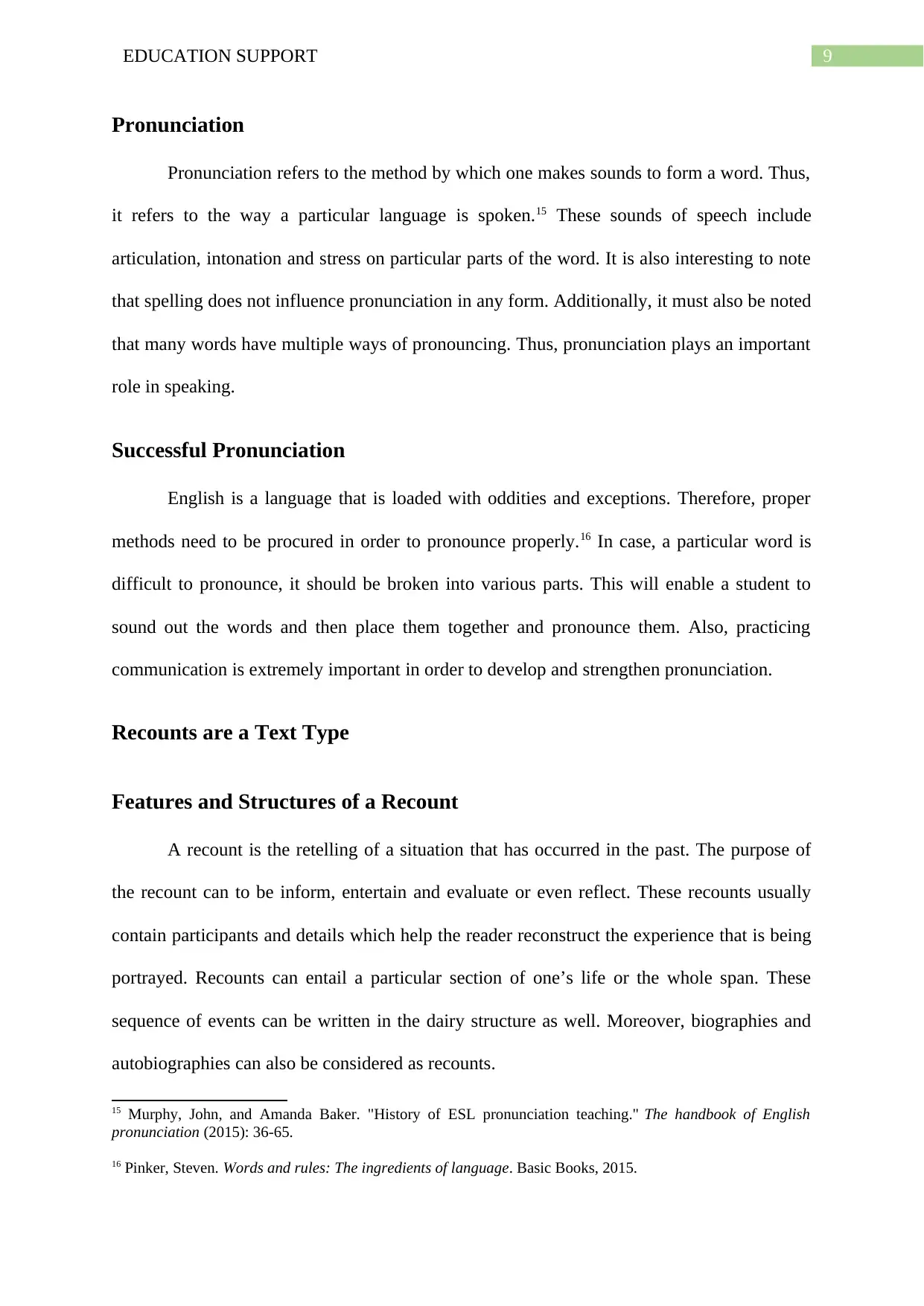
Pronunciation
Pronunciation refers to the method by which one makes sounds to form a word. Thus,
it refers to the way a particular language is spoken.15 These sounds of speech include
articulation, intonation and stress on particular parts of the word. It is also interesting to note
that spelling does not influence pronunciation in any form. Additionally, it must also be noted
that many words have multiple ways of pronouncing. Thus, pronunciation plays an important
role in speaking.
Successful Pronunciation
English is a language that is loaded with oddities and exceptions. Therefore, proper
methods need to be procured in order to pronounce properly.16 In case, a particular word is
difficult to pronounce, it should be broken into various parts. This will enable a student to
sound out the words and then place them together and pronounce them. Also, practicing
communication is extremely important in order to develop and strengthen pronunciation.
Recounts are a Text Type
Features and Structures of a Recount
A recount is the retelling of a situation that has occurred in the past. The purpose of
the recount can to be inform, entertain and evaluate or even reflect. These recounts usually
contain participants and details which help the reader reconstruct the experience that is being
portrayed. Recounts can entail a particular section of one’s life or the whole span. These
sequence of events can be written in the dairy structure as well. Moreover, biographies and
autobiographies can also be considered as recounts.
15 Murphy, John, and Amanda Baker. "History of ESL pronunciation teaching." The handbook of English
pronunciation (2015): 36-65.
16 Pinker, Steven. Words and rules: The ingredients of language. Basic Books, 2015.
Paraphrase This Document
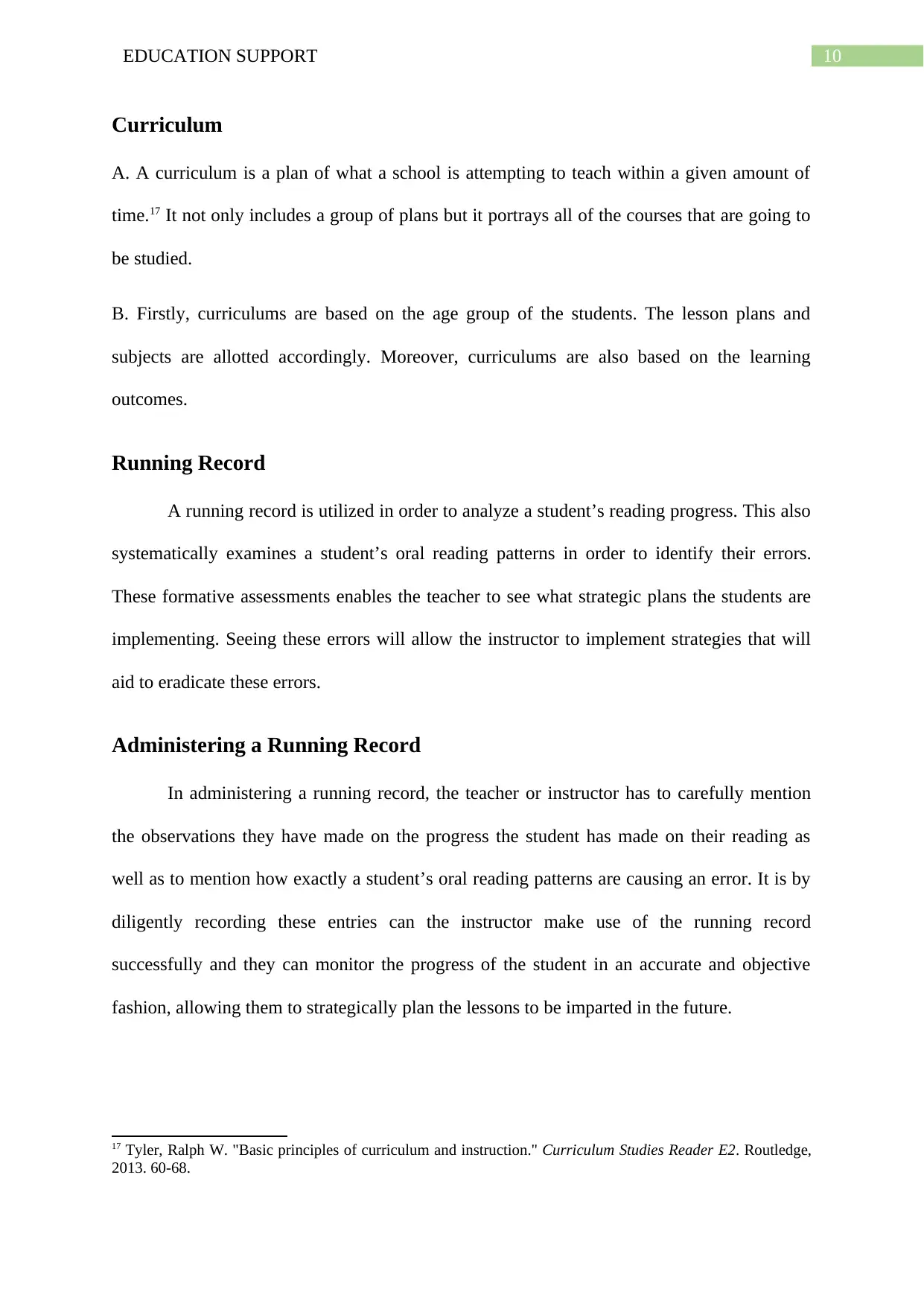
Curriculum
A. A curriculum is a plan of what a school is attempting to teach within a given amount of
time.17 It not only includes a group of plans but it portrays all of the courses that are going to
be studied.
B. Firstly, curriculums are based on the age group of the students. The lesson plans and
subjects are allotted accordingly. Moreover, curriculums are also based on the learning
outcomes.
Running Record
A running record is utilized in order to analyze a student’s reading progress. This also
systematically examines a student’s oral reading patterns in order to identify their errors.
These formative assessments enables the teacher to see what strategic plans the students are
implementing. Seeing these errors will allow the instructor to implement strategies that will
aid to eradicate these errors.
Administering a Running Record
In administering a running record, the teacher or instructor has to carefully mention
the observations they have made on the progress the student has made on their reading as
well as to mention how exactly a student’s oral reading patterns are causing an error. It is by
diligently recording these entries can the instructor make use of the running record
successfully and they can monitor the progress of the student in an accurate and objective
fashion, allowing them to strategically plan the lessons to be imparted in the future.
17 Tyler, Ralph W. "Basic principles of curriculum and instruction." Curriculum Studies Reader E2. Routledge,
2013. 60-68.
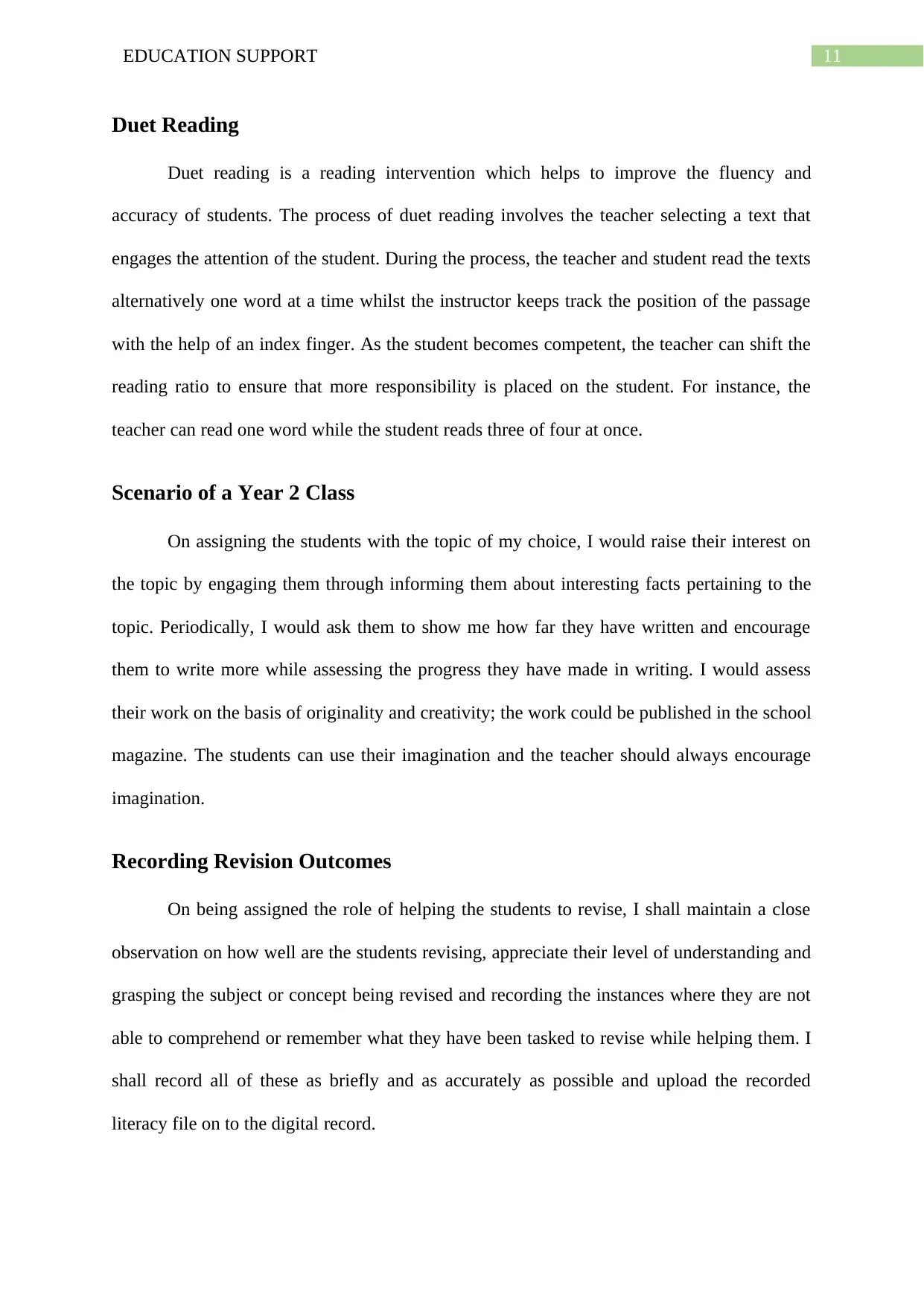
Duet Reading
Duet reading is a reading intervention which helps to improve the fluency and
accuracy of students. The process of duet reading involves the teacher selecting a text that
engages the attention of the student. During the process, the teacher and student read the texts
alternatively one word at a time whilst the instructor keeps track the position of the passage
with the help of an index finger. As the student becomes competent, the teacher can shift the
reading ratio to ensure that more responsibility is placed on the student. For instance, the
teacher can read one word while the student reads three of four at once.
Scenario of a Year 2 Class
On assigning the students with the topic of my choice, I would raise their interest on
the topic by engaging them through informing them about interesting facts pertaining to the
topic. Periodically, I would ask them to show me how far they have written and encourage
them to write more while assessing the progress they have made in writing. I would assess
their work on the basis of originality and creativity; the work could be published in the school
magazine. The students can use their imagination and the teacher should always encourage
imagination.
Recording Revision Outcomes
On being assigned the role of helping the students to revise, I shall maintain a close
observation on how well are the students revising, appreciate their level of understanding and
grasping the subject or concept being revised and recording the instances where they are not
able to comprehend or remember what they have been tasked to revise while helping them. I
shall record all of these as briefly and as accurately as possible and upload the recorded
literacy file on to the digital record.
⊘ This is a preview!⊘
Do you want full access?
Subscribe today to unlock all pages.

Trusted by 1+ million students worldwide
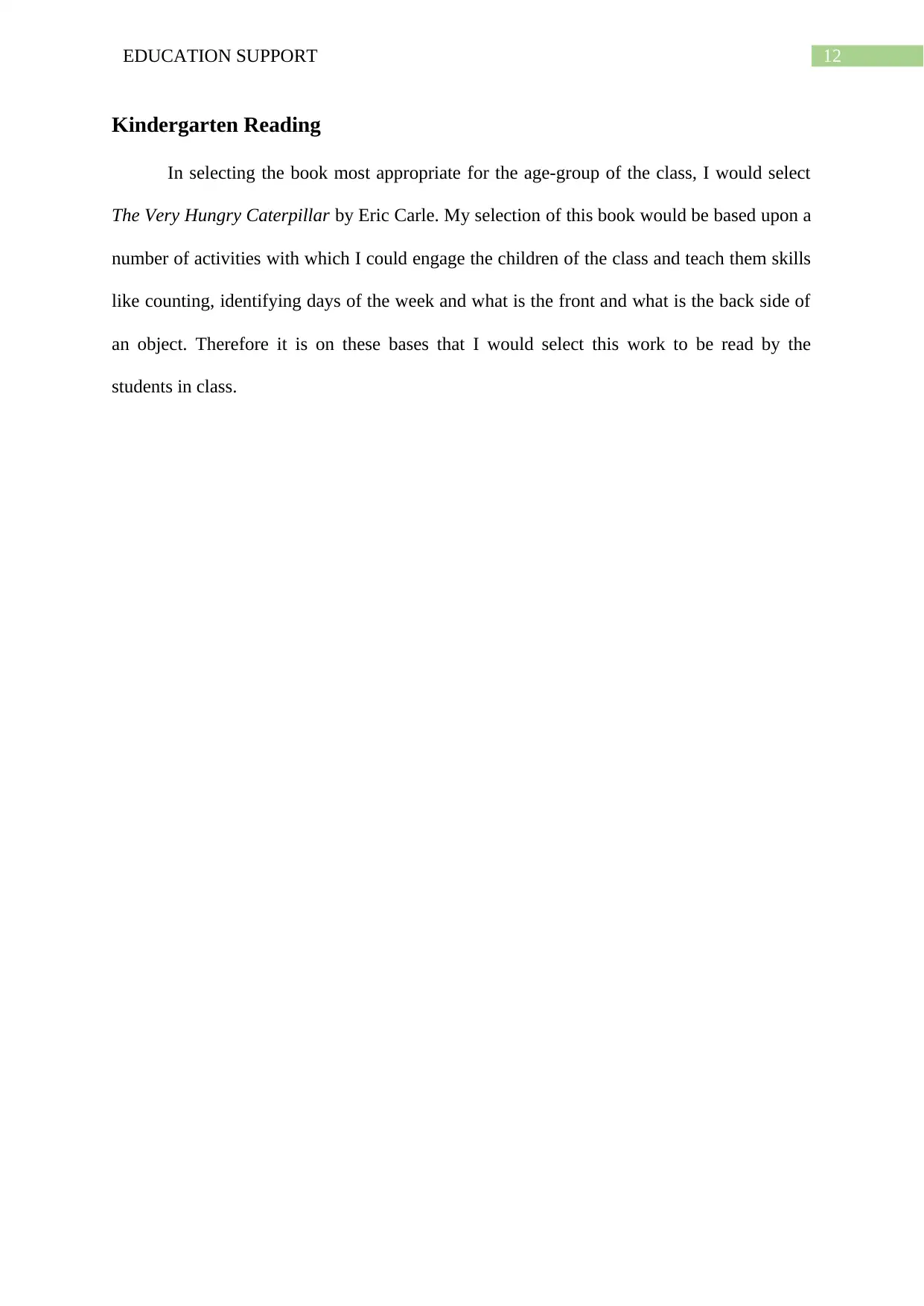
Kindergarten Reading
In selecting the book most appropriate for the age-group of the class, I would select
The Very Hungry Caterpillar by Eric Carle. My selection of this book would be based upon a
number of activities with which I could engage the children of the class and teach them skills
like counting, identifying days of the week and what is the front and what is the back side of
an object. Therefore it is on these bases that I would select this work to be read by the
students in class.
Paraphrase This Document
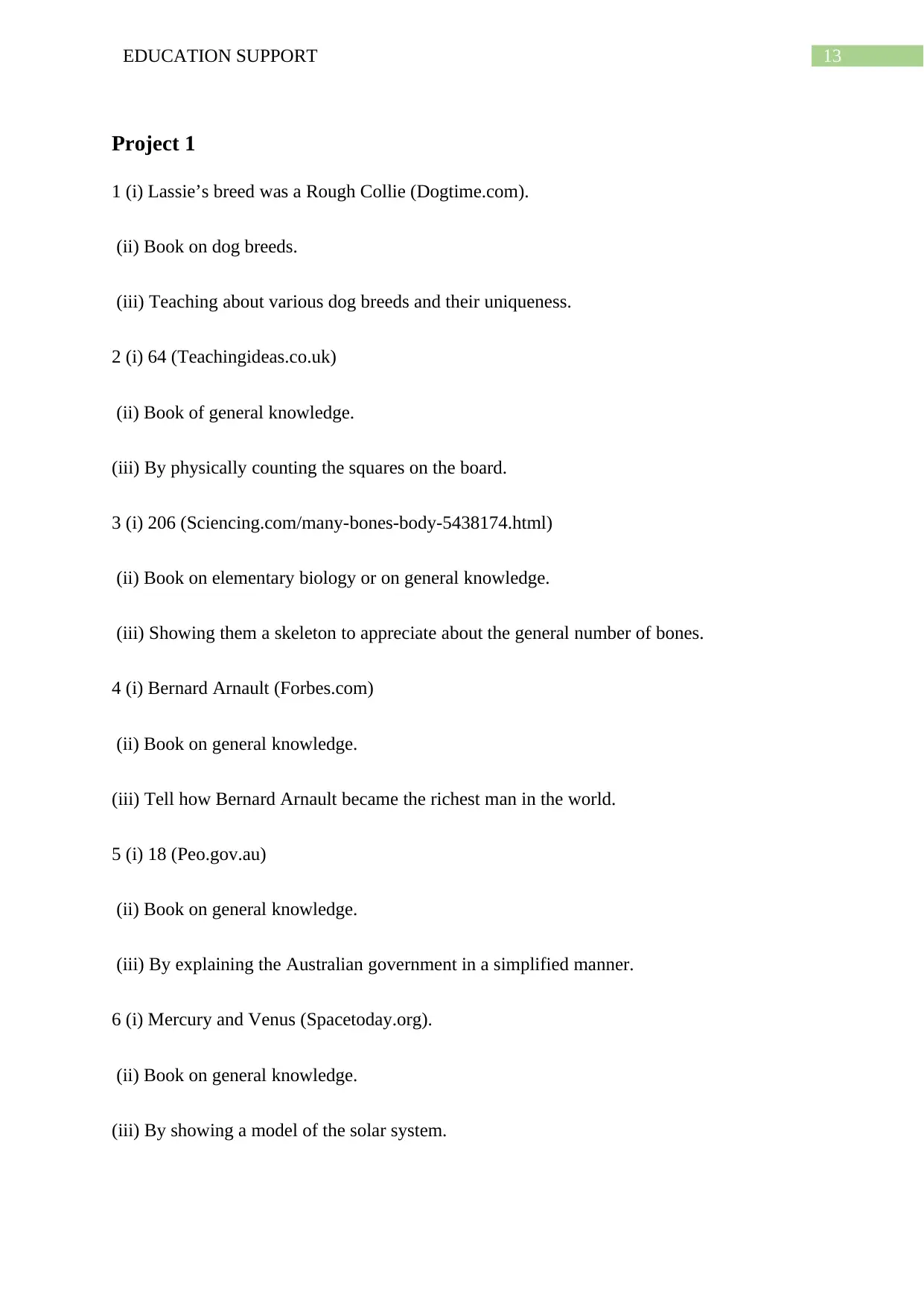
Project 1
1 (i) Lassie’s breed was a Rough Collie (Dogtime.com).
(ii) Book on dog breeds.
(iii) Teaching about various dog breeds and their uniqueness.
2 (i) 64 (Teachingideas.co.uk)
(ii) Book of general knowledge.
(iii) By physically counting the squares on the board.
3 (i) 206 (Sciencing.com/many-bones-body-5438174.html)
(ii) Book on elementary biology or on general knowledge.
(iii) Showing them a skeleton to appreciate about the general number of bones.
4 (i) Bernard Arnault (Forbes.com)
(ii) Book on general knowledge.
(iii) Tell how Bernard Arnault became the richest man in the world.
5 (i) 18 (Peo.gov.au)
(ii) Book on general knowledge.
(iii) By explaining the Australian government in a simplified manner.
6 (i) Mercury and Venus (Spacetoday.org).
(ii) Book on general knowledge.
(iii) By showing a model of the solar system.
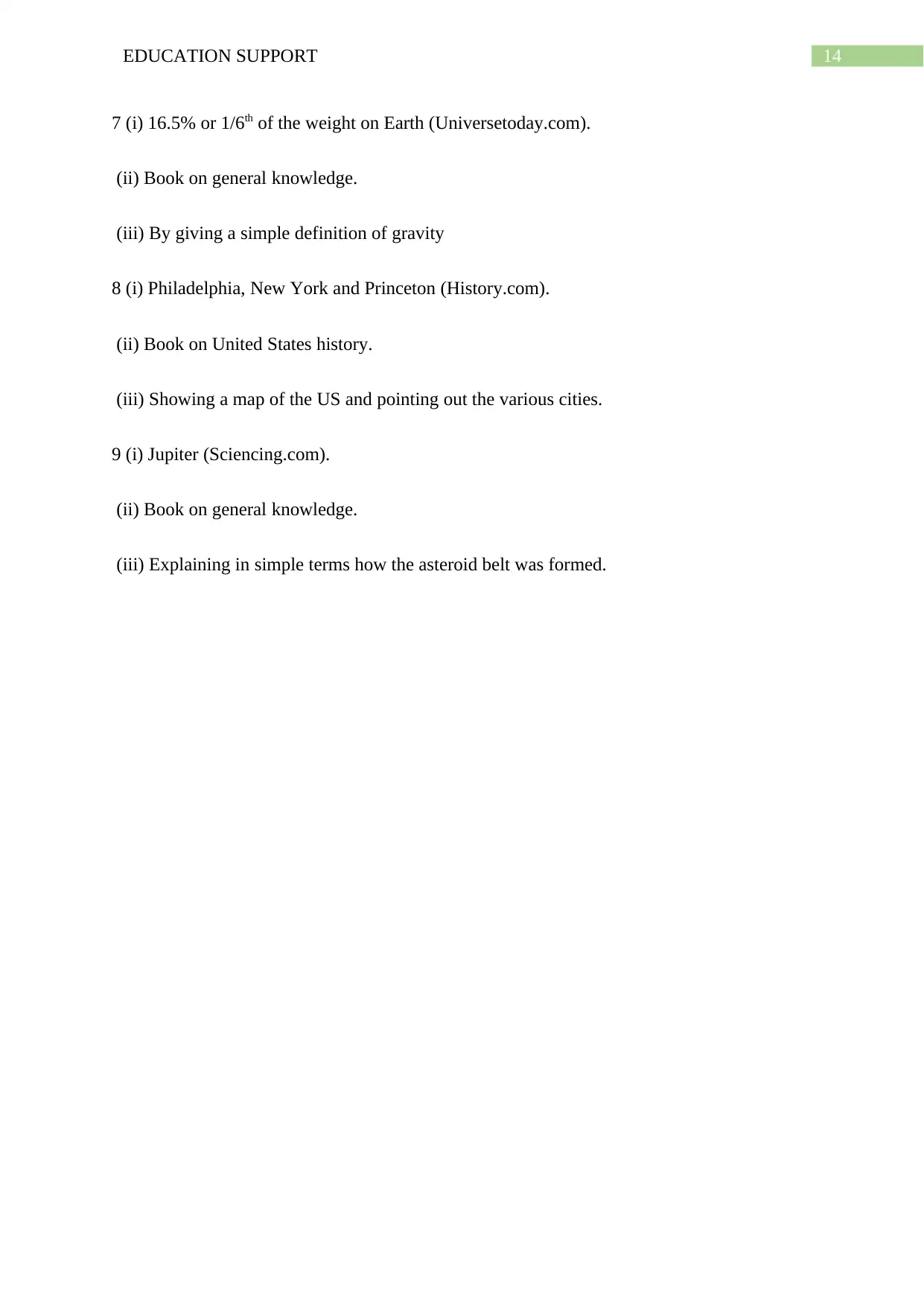
7 (i) 16.5% or 1/6th of the weight on Earth (Universetoday.com).
(ii) Book on general knowledge.
(iii) By giving a simple definition of gravity
8 (i) Philadelphia, New York and Princeton (History.com).
(ii) Book on United States history.
(iii) Showing a map of the US and pointing out the various cities.
9 (i) Jupiter (Sciencing.com).
(ii) Book on general knowledge.
(iii) Explaining in simple terms how the asteroid belt was formed.
⊘ This is a preview!⊘
Do you want full access?
Subscribe today to unlock all pages.

Trusted by 1+ million students worldwide
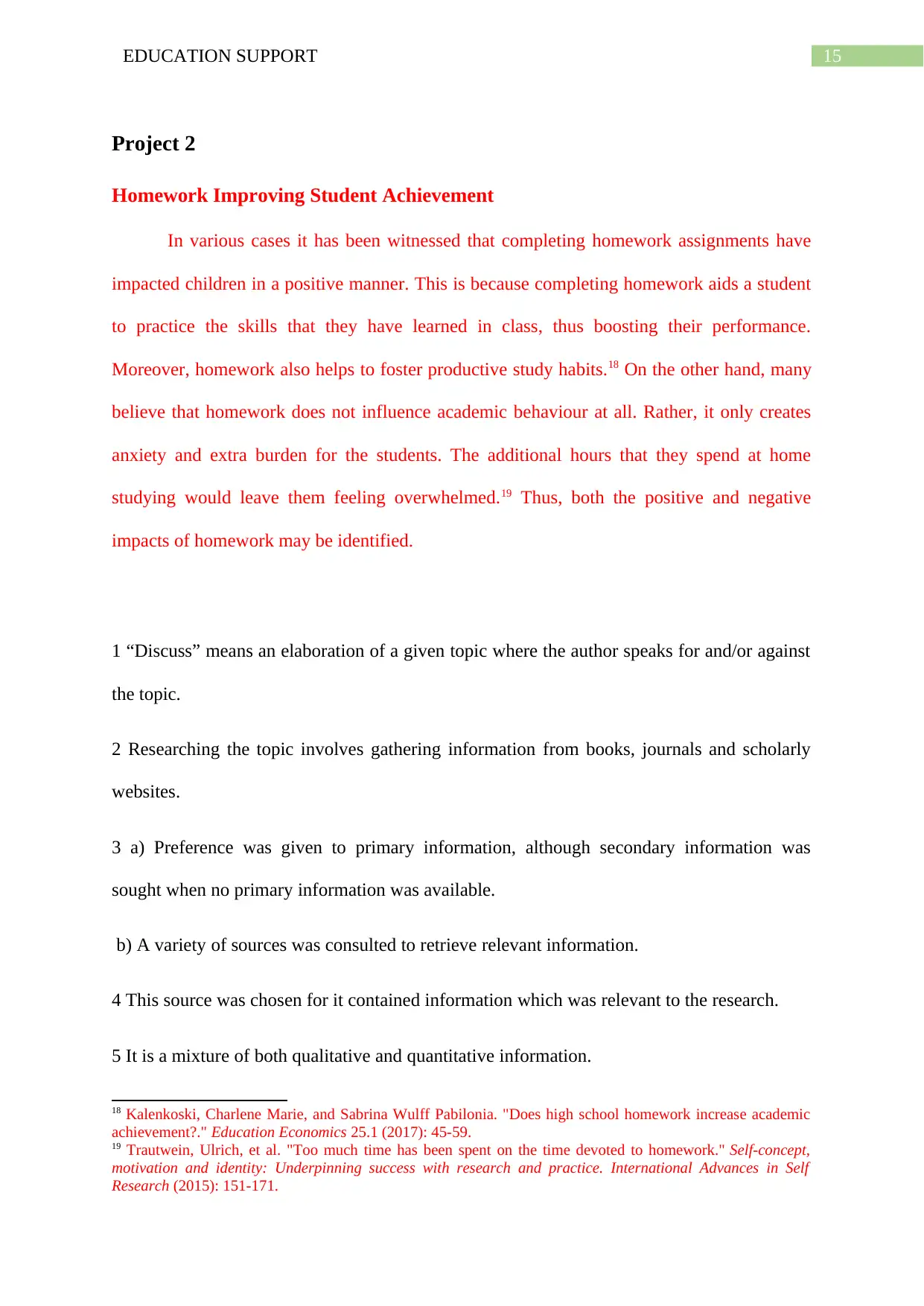
Project 2
Homework Improving Student Achievement
In various cases it has been witnessed that completing homework assignments have
impacted children in a positive manner. This is because completing homework aids a student
to practice the skills that they have learned in class, thus boosting their performance.
Moreover, homework also helps to foster productive study habits.18 On the other hand, many
believe that homework does not influence academic behaviour at all. Rather, it only creates
anxiety and extra burden for the students. The additional hours that they spend at home
studying would leave them feeling overwhelmed.19 Thus, both the positive and negative
impacts of homework may be identified.
1 “Discuss” means an elaboration of a given topic where the author speaks for and/or against
the topic.
2 Researching the topic involves gathering information from books, journals and scholarly
websites.
3 a) Preference was given to primary information, although secondary information was
sought when no primary information was available.
b) A variety of sources was consulted to retrieve relevant information.
4 This source was chosen for it contained information which was relevant to the research.
5 It is a mixture of both qualitative and quantitative information.
18 Kalenkoski, Charlene Marie, and Sabrina Wulff Pabilonia. "Does high school homework increase academic
achievement?." Education Economics 25.1 (2017): 45-59.
19 Trautwein, Ulrich, et al. "Too much time has been spent on the time devoted to homework." Self-concept,
motivation and identity: Underpinning success with research and practice. International Advances in Self
Research (2015): 151-171.
Paraphrase This Document
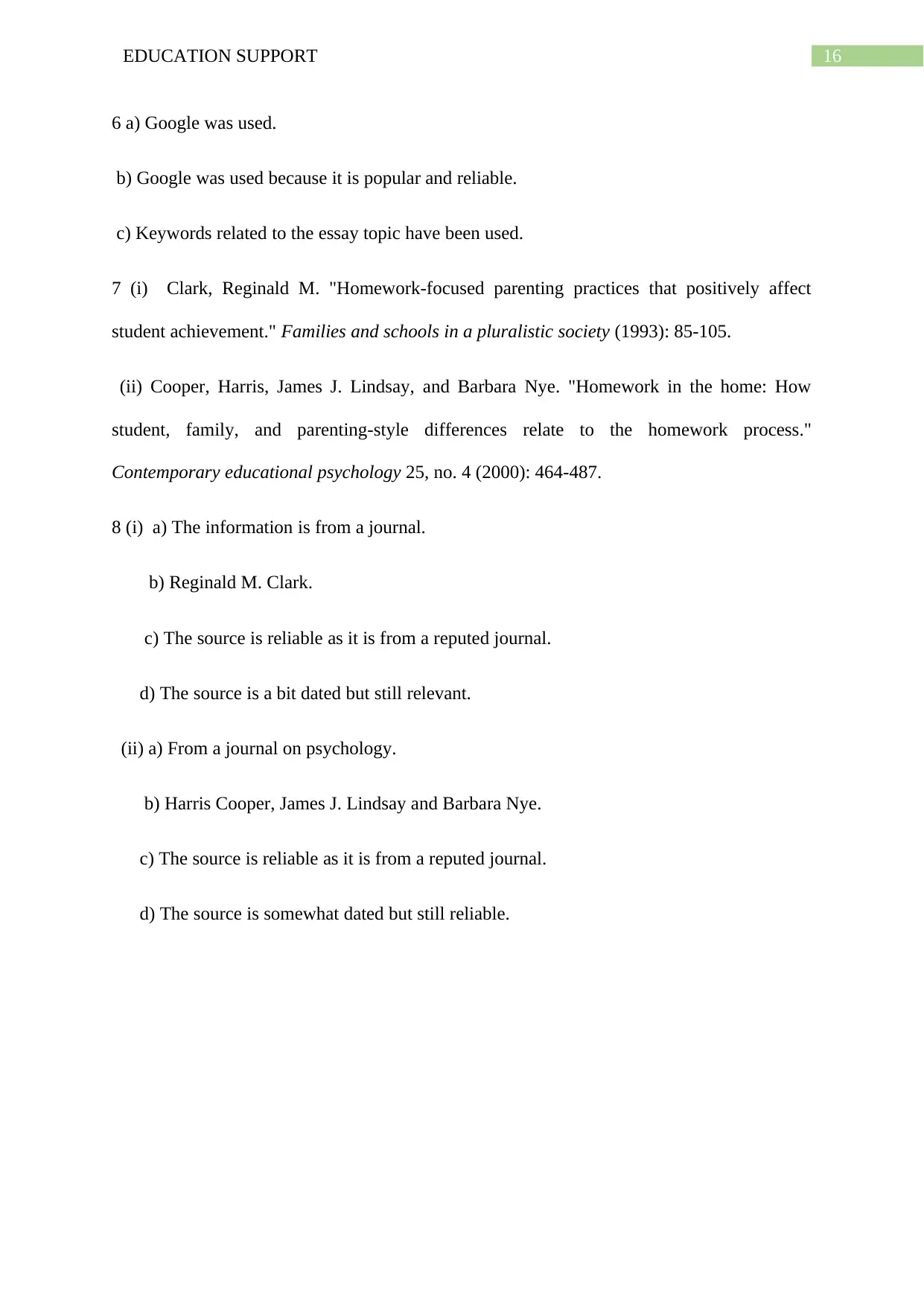
6 a) Google was used.
b) Google was used because it is popular and reliable.
c) Keywords related to the essay topic have been used.
7 (i) Clark, Reginald M. "Homework-focused parenting practices that positively affect
student achievement." Families and schools in a pluralistic society (1993): 85-105.
(ii) Cooper, Harris, James J. Lindsay, and Barbara Nye. "Homework in the home: How
student, family, and parenting-style differences relate to the homework process."
Contemporary educational psychology 25, no. 4 (2000): 464-487.
8 (i) a) The information is from a journal.
b) Reginald M. Clark.
c) The source is reliable as it is from a reputed journal.
d) The source is a bit dated but still relevant.
(ii) a) From a journal on psychology.
b) Harris Cooper, James J. Lindsay and Barbara Nye.
c) The source is reliable as it is from a reputed journal.
d) The source is somewhat dated but still reliable.
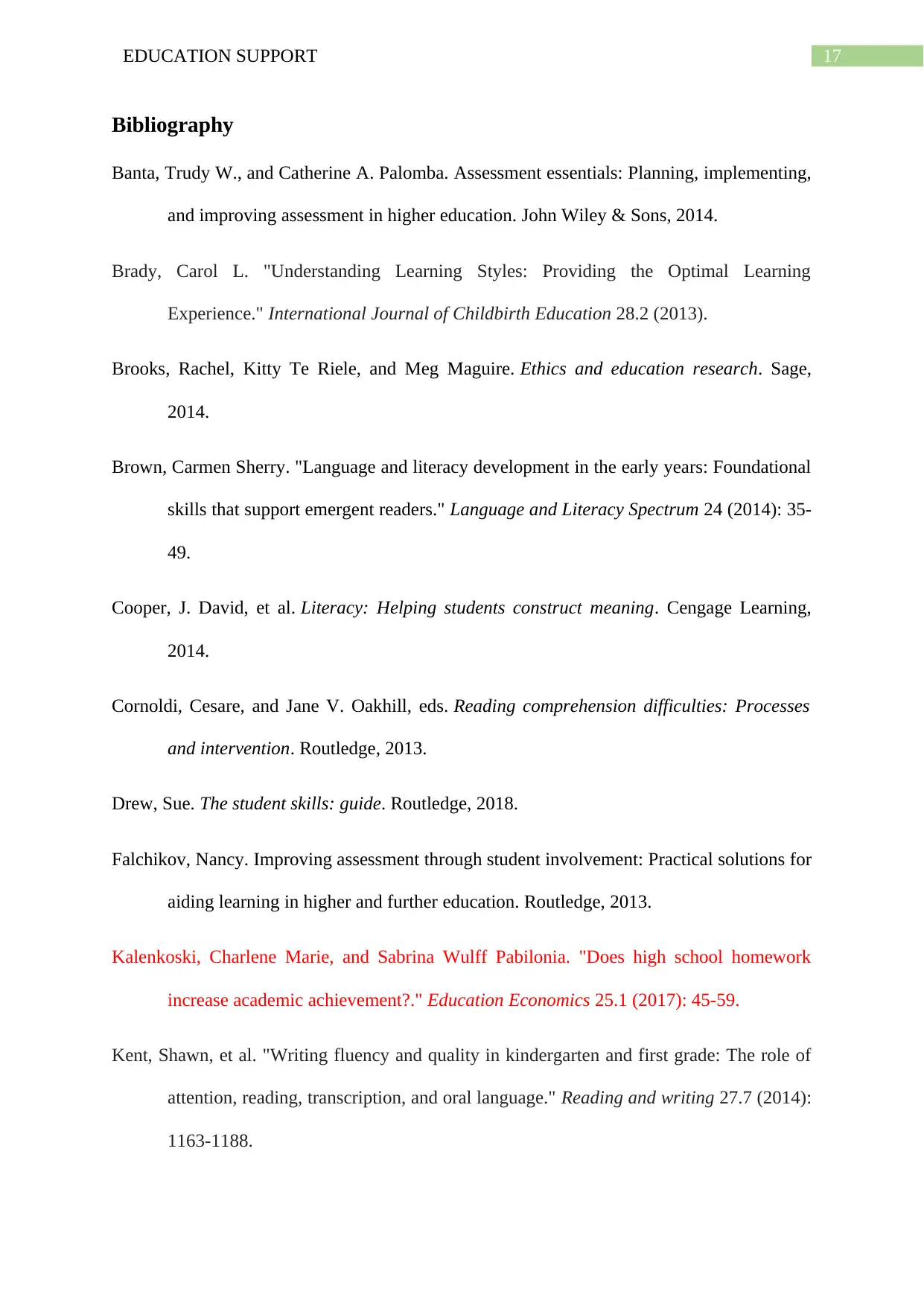
Bibliography
Banta, Trudy W., and Catherine A. Palomba. Assessment essentials: Planning, implementing,
and improving assessment in higher education. John Wiley & Sons, 2014.
Brady, Carol L. "Understanding Learning Styles: Providing the Optimal Learning
Experience." International Journal of Childbirth Education 28.2 (2013).
Brooks, Rachel, Kitty Te Riele, and Meg Maguire. Ethics and education research. Sage,
2014.
Brown, Carmen Sherry. "Language and literacy development in the early years: Foundational
skills that support emergent readers." Language and Literacy Spectrum 24 (2014): 35-
49.
Cooper, J. David, et al. Literacy: Helping students construct meaning. Cengage Learning,
2014.
Cornoldi, Cesare, and Jane V. Oakhill, eds. Reading comprehension difficulties: Processes
and intervention. Routledge, 2013.
Drew, Sue. The student skills: guide. Routledge, 2018.
Falchikov, Nancy. Improving assessment through student involvement: Practical solutions for
aiding learning in higher and further education. Routledge, 2013.
Kalenkoski, Charlene Marie, and Sabrina Wulff Pabilonia. "Does high school homework
increase academic achievement?." Education Economics 25.1 (2017): 45-59.
Kent, Shawn, et al. "Writing fluency and quality in kindergarten and first grade: The role of
attention, reading, transcription, and oral language." Reading and writing 27.7 (2014):
1163-1188.
⊘ This is a preview!⊘
Do you want full access?
Subscribe today to unlock all pages.

Trusted by 1+ million students worldwide
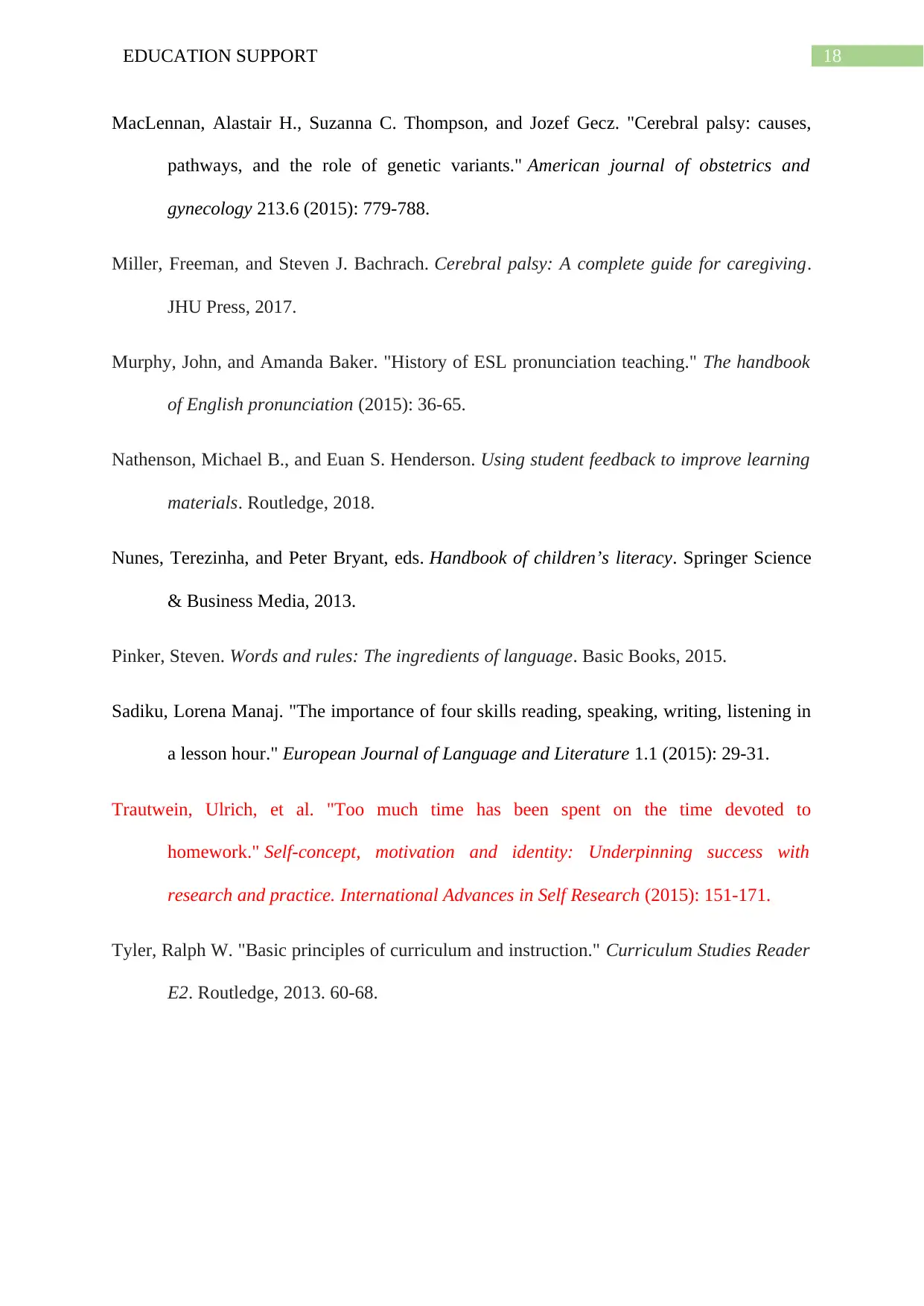
MacLennan, Alastair H., Suzanna C. Thompson, and Jozef Gecz. "Cerebral palsy: causes,
pathways, and the role of genetic variants." American journal of obstetrics and
gynecology 213.6 (2015): 779-788.
Miller, Freeman, and Steven J. Bachrach. Cerebral palsy: A complete guide for caregiving.
JHU Press, 2017.
Murphy, John, and Amanda Baker. "History of ESL pronunciation teaching." The handbook
of English pronunciation (2015): 36-65.
Nathenson, Michael B., and Euan S. Henderson. Using student feedback to improve learning
materials. Routledge, 2018.
Nunes, Terezinha, and Peter Bryant, eds. Handbook of children’s literacy. Springer Science
& Business Media, 2013.
Pinker, Steven. Words and rules: The ingredients of language. Basic Books, 2015.
Sadiku, Lorena Manaj. "The importance of four skills reading, speaking, writing, listening in
a lesson hour." European Journal of Language and Literature 1.1 (2015): 29-31.
Trautwein, Ulrich, et al. "Too much time has been spent on the time devoted to
homework." Self-concept, motivation and identity: Underpinning success with
research and practice. International Advances in Self Research (2015): 151-171.
Tyler, Ralph W. "Basic principles of curriculum and instruction." Curriculum Studies Reader
E2. Routledge, 2013. 60-68.
Related Documents
Your All-in-One AI-Powered Toolkit for Academic Success.
+13062052269
info@desklib.com
Available 24*7 on WhatsApp / Email
![[object Object]](/_next/static/media/star-bottom.7253800d.svg)
© 2024 | Zucol Services PVT LTD | All rights reserved.





